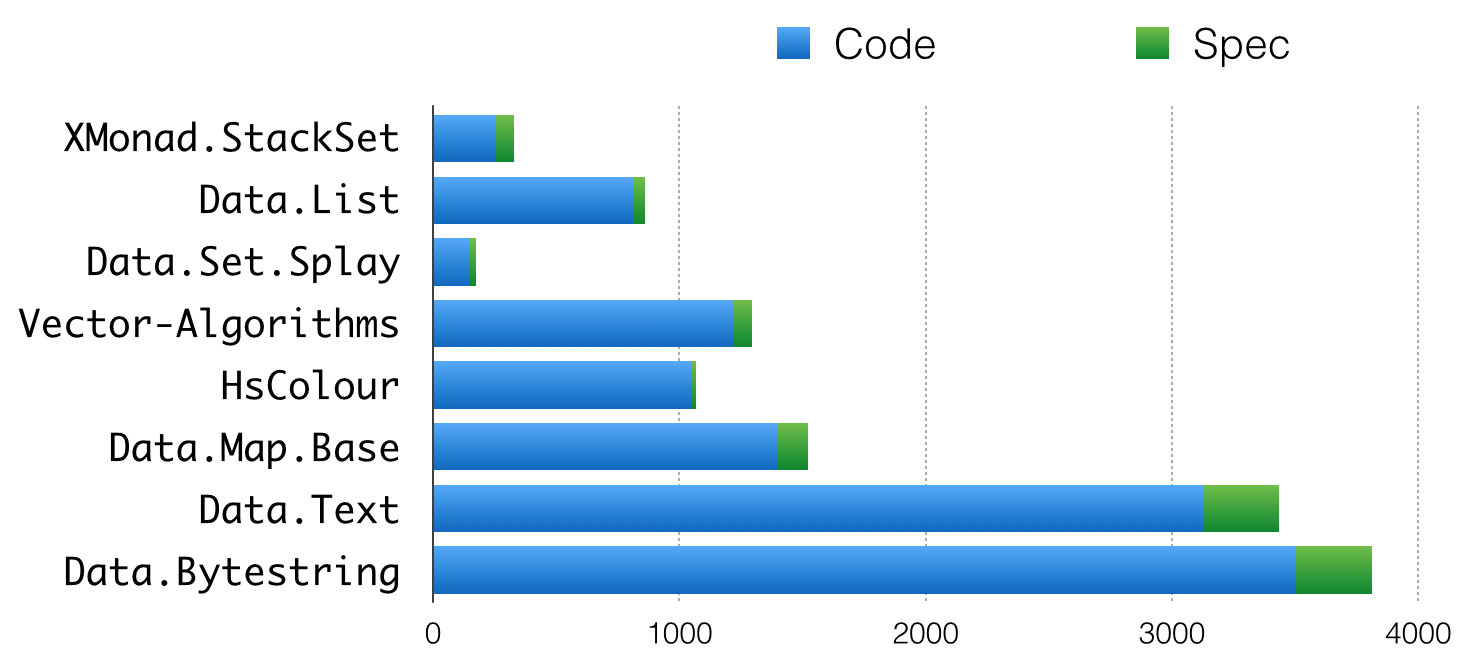{#ASda}
========
Evaluation
----------
\begin{code}
main = putStrLn "Easter Egg: to force Makefile"
\end{code}
Evaluation
==========
LiquidHaskell
-------------
**Diverse Code Bases**
10KLoc
56 Modules
LiquidHaskell
-------------
**Complex Properties**
Memory Safety
Functional Correctness*
Termination
**Inference is Crucial**
Benchmarks
----------
**Library**
--------------------------- ---------
`XMonad.StackSet`
`Data.List`
`Data.Set.Splay`
`Data.Vector.Algorithms`
`HsColour`
`Data.Map.Base`
`Data.Text`
`Data.Bytestring`
--------------------------- ---------
Benchmarks
----------
**Library** **LOC**
--------------------------- ---------
`XMonad.StackSet` 256
`Data.List` 814
`Data.Set.Splay` 149
`Data.Vector.Algorithms` 1219
`HsColour` 1047
`Data.Map.Base` 1396
`Data.Text` 3128
`Data.Bytestring` 3505
**Total** **11512**
--------------------------- ---------
Benchmarks
----------
**Library** **LOC** **Specs**
--------------------------- --------- -----------
`XMonad.StackSet` 256 74
`Data.List` 814 46
`Data.Set.Splay` 149 27
`Data.Vector.Algorithms` 1219 76
`HsColour` 1047 19
`Data.Map.Base` 1396 125
`Data.Text` 3128 305
`Data.Bytestring` 3505 307
**Total** **11512** **977**
--------------------------- --------- -----------
Code v. Specs
-------------
 Code v. Specs
-------------
Code v. Specs
-------------
 **About 8.5%**
*Very* coarse measure...
Running Time
------------
**About 8.5%**
*Very* coarse measure...
Running Time
------------
**Library** **LOC** **Specs** **Time**
--------------------------- --------- ----------- ----------
`XMonad.StackSet` 256 74 27s
`Data.List` 814 46 26s
`Data.Set.Splay` 149 27 27s
`Data.Vector.Algorithms` 1219 76 89s
`HsColour` 1047 19 196s
`Data.Map.Base` 1396 125 174s
`Data.Text` 3128 305 499s
`Data.Bytestring` 3505 307 294s
**Total** **11512** **977** **1336s**
--------------------------- --------- ----------- ----------
{#comments}
============
Types as Comments
-----------------
**Types are Machine Checked Comments**
+ Express same *requirements*
+ But *connected to* code
**Always in sync as code changes**
Liquid Types as Machine Checked Comments
========================================
Example: Data.Map
-----------------
**Requirement**
`Map a b` is a *binary search* ordered tree
Example: Data.Map
-----------------
**Comment**
\begin{spec}
-- @join@ assumes that all values in [l] < [k]
-- and all values in [r] > [k], and
-- that [l] and [r] are valid trees.
\end{spec}
**Type**
\begin{spec}
join :: k:a -> b
-> l:Map {v:a | v < k} b
-> r:Map {v:a | v > k} b
-> Map a b
\end{spec}
Example: Data.ByteString
------------------------
**Requirement**
Fast, low-level indices into a `ByteString` must be in bounds.
Example: Data.ByteString
------------------------
**Comment**
\begin{spec}
-- Unsafe 'ByteString' index (subscript) ...
-- omits the bounds check, which means there
-- is an obligation to ensure the bounds are
-- checked in some other way.
\end{spec}
**Type**
\begin{spec}
unsafeIndex :: b:ByteString
-> {v:Nat | v < bLength b}
-> Word8
\end{spec}
Example: Data.ByteString
------------------------
**Requirement**
Fast *truncation* requires valid size.
Example: Data.ByteString
------------------------
**Comment**
\begin{spec}
-- omits the checks on @n@ so there is
-- an obligation to provide a proof
-- that @0 <= n <= 'length' xs@
\end{spec}
**Type**
\begin{spec}
unsafeTake :: n:Nat
-> {v:ByteString | n <= bLength v}
-> {v:ByteString | n = bLength v}
\end{spec}
{#cont}
=========
Continue
--------
[[continue...]](12_Conclusion.lhs.slides.html)
{#recap}
=========
Recap
-----
1. Refinements: Types + Predicates
2. Subtyping: SMT Implication
3. Measures: Strengthened Constructors
4. Abstract: Refinements over functions and data
5. **Evaluation**
6.
 Code v. Specs
-------------
Code v. Specs
-------------
 **About 8.5%**
*Very* coarse measure...
Running Time
------------
**About 8.5%**
*Very* coarse measure...
Running Time
------------